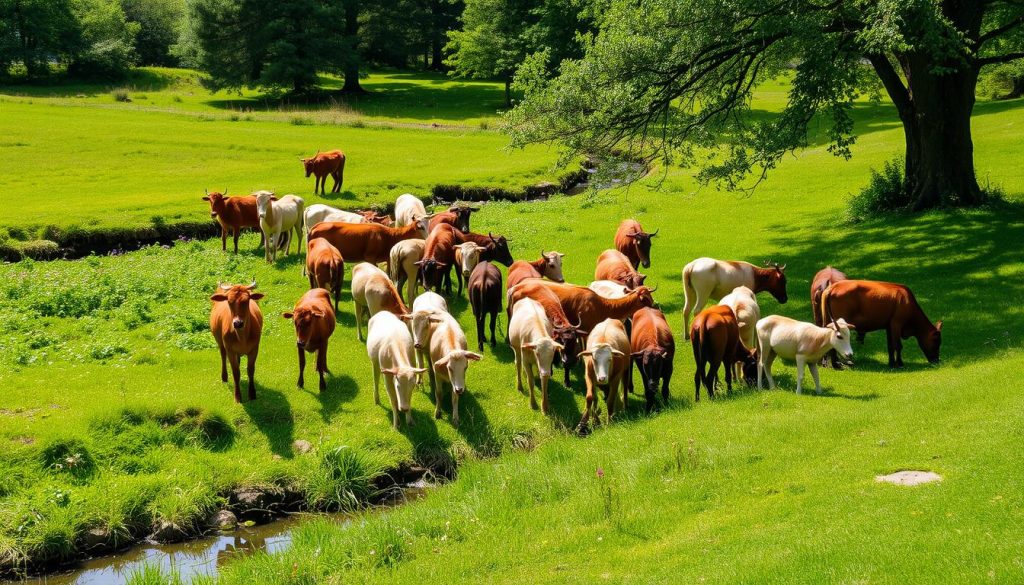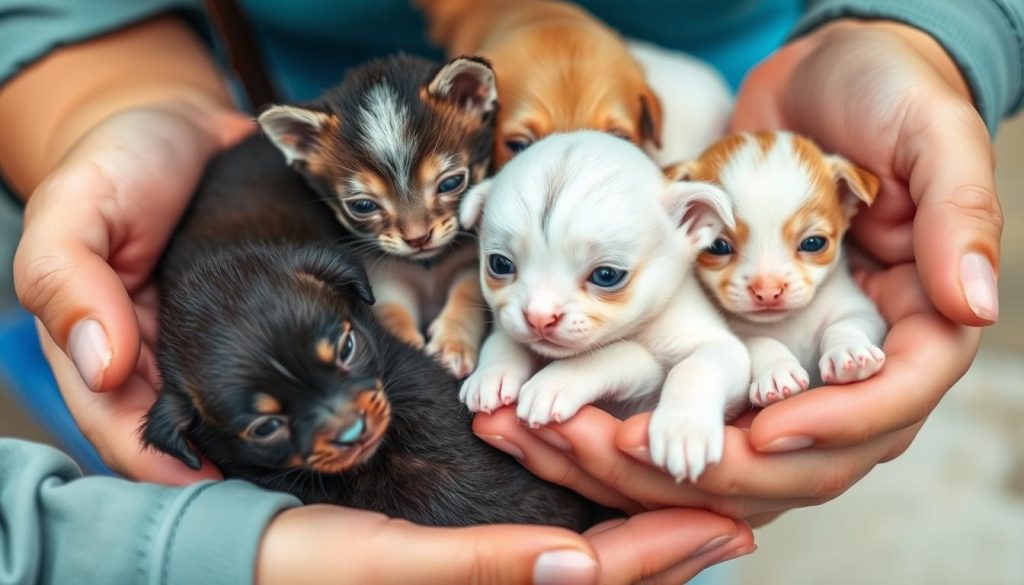Exploring animal welfare shows us how important treating animals right is. It’s key to our society’s well-being. Animal welfare means animals are treated kindly and kept safe from harm. Animal rights, on the other hand, are about animals having legal and moral rights.
Animal welfare is very important. It affects animal rights, the environment, and our health. By caring for animals, we make the world a better place. This article will look at animal welfare, its global effects, and how we can help animals, showing how all these areas are connected.
Introduction to Animal Welfare
Animal welfare is a big issue that needs a detailed look. It involves humans, animals, and the environment. By studying animal welfare, we learn more about treating animals right and its role today.
Key Takeaways
- Animal welfare is essential for ensuring the humane treatment of animals
- Animal welfare and animal rights are distinct concepts with different focuses
- Ethical treatment of animals has a positive impact on environmental conservation
- Animal welfare is closely linked to public health and sustainable development
- Prioritizing animal welfare can create a more compassionate and sustainable world
- Understanding animal welfare is crucial for promoting animal rights and ethical treatment of animals
Understanding the Fundamentals of Animal Welfare
Exploring animal care shows how vital it is to grasp animal welfare basics. Protecting and advocating for animals is key to their well-being. The Farm Animal Welfare Council has outlined the Five Freedoms of Animal Welfare. These freedoms help us understand animal welfare better.
These freedoms include freedom from hunger and thirst, freedom from discomfort, freedom from pain, injury, or disease, freedom from fear and distress, and freedom to express normal behavior. By knowing these core principles, we can improve animal care and protection.
Defining Animal Welfare in Modern Context
In today’s world, animal welfare goes beyond just basic needs. It’s about ensuring animals’ emotional and psychological well-being too. Animal advocacy is crucial in promoting welfare and spreading awareness about treating animals with respect and kindness.
The Five Freedoms of Animal Welfare
The Five Freedoms of Animal Welfare are:
- Freedom from hunger and thirst
- Freedom from discomfort
- Freedom from pain, injury, or disease
- Freedom from fear and distress
- Freedom to express normal behavior
Distinguishing Between Animal Welfare and Animal Rights
Animal welfare and animal rights are often confused, but they’re different. Welfare focuses on animals’ well-being, while rights advocate for their rights and interests. Knowing the difference is key for effective animal care and protection.
The Global Impact of Animal Protection Efforts
Exploring animal welfare shows us how important global teamwork is. Groups like the World Animal Protection play a big role. They help us see why we must protect animals and their homes.
Thanks to them, we see more efforts to help pets and save wildlife. This is a big step forward.
Some great examples of these efforts include:
- International agreements to protect endangered species
- Collaborative efforts to combat wildlife trafficking
- Community-based programs to promote animal welfare and wildlife conservation
As we face the challenges of wildlife conservation and pet welfare, we must all play a part. Governments, NGOs, and individuals must work together. This way, we can make a kinder and greener world for all.
The World Animal Protection says it well: “animals are not just a part of our world, they are our world.”
By protecting animals, we are not only preserving their welfare but also ensuring the health of our planet and the well-being of future generations.
Why Animal Welfare Matters in Today’s Society
Modern life is complex, and animal welfare is key. How we treat animals affects our world, health, and economy. By focusing on ethical treatment of animals, we build a better, kinder world.
Animal welfare and saving the environment are closely tied. Animal farming harms our planet, causing pollution and climate change. Eating less meat and supporting green farming helps our planet and animal rights.
Environmental Conservation Connection
- Reducing greenhouse gas emissions through sustainable agriculture
- Promoting biodiversity by preserving natural habitats
- Conserving water resources through efficient farming practices
Animal welfare also affects our health. Animal mistreatment can spread diseases like COVID-19. Treating animals well keeps us healthier.
Public Health Implications
Also, caring for animals helps our economy. The animal farming industry is big and important. By treating animals right, we create jobs and boost local economies.
| Economic Benefits | Description |
|---|---|
| Job creation | New employment opportunities in sustainable agriculture and animal care |
| Local economic growth | Stimulating local economies through sustainable agriculture and animal-related tourism |
The Science Behind Animal Care and Well-being
Exploring animal care and well-being, we find it’s all about science. Studies on animal behavior, physiology, and psychology are key. They help us understand what animals need to be happy and healthy.
Important aspects of animal care include nutrition, environmental enrichment, and social interaction. These factors are crucial for an animal’s well-being. A good diet and a stimulating environment are essential. They help reduce stress and keep animals mentally healthy.
Knowing about animal behavior and psychology helps us advocate better. It shows us animals have complex lives. This knowledge helps us create kinder systems for their care.

The science of animal care shows we need a complete approach to their welfare. We must consider their physical, emotional, and social needs. This way, we can make a world where animals are respected and loved, which is at the heart of animal advocacy and protection.
Current Challenges in Animal Welfare
We must keep fighting for animal welfare and animal rights. There are still big challenges to overcome. These issues affect animals all over the world.
Big problems include factory farming, wildlife trafficking, and rules for the pet industry. These issues hurt animals and our planet. For example, factory farming causes deforestation and pollutes water.
We need to make and follow stricter rules. This can happen through government actions, awareness campaigns, and personal efforts. Together, we can make a kinder world for all.
Key Areas of Concern
- Factory farming: inhumane treatment of farm animals, environmental degradation, and public health risks
- Wildlife trafficking: illegal trade of endangered species, habitat destruction, and loss of biodiversity
- Pet industry regulations: ensuring the welfare of pets, preventing animal cruelty, and promoting responsible pet ownership
By facing these challenges, we can improve animal welfare and animal rights. This will help make the world a better place for everyone.
How I Support Humane Treatment of Animals
I think it’s key to support humane treatment of animals every day. We can do this by picking cruelty-free products. Also, we should back groups that care for animal welfare.
Here are some ways to help animal welfare:
- Supporting animal advocacy groups that help animals
- Helping out at local animal shelters or wildlife groups
- Telling others about the need for humane treatment of animals on social media and at events
Every little bit helps, and together, we can make big changes for animals. By supporting animal advocacy and caring for animals, we can make the world a better place for everyone.
| Organization | Mission |
|---|---|
| Animal Welfare Institute | To improve the treatment and welfare of animals |
| Humane Society | To protect animals from cruelty and promote kindness and compassion |
Making a Difference Through Animal Advocacy
Exploring animal welfare shows us making a difference needs many ways. Animal advocacy is more than just supporting animal rights. It’s also about improving animal welfare through different means.
By helping out locally, using digital tools, and teaching others, we can help animals. This helps improve their lives.
Animal advocacy helps us show the world how important kindness to animals is. We support groups that help animals, join fundraising events, and tell others about animal rights. This way, we inspire more people to help.
Local Volunteer Opportunities
Helping out at animal shelters, wildlife centers, and conservation groups is great. These places need people to care for animals and help with daily tasks. Volunteering lets us learn about animal welfare firsthand.
Digital Activism Strategies
Digital tools have changed how we fight for animal welfare. Social media, online petitions, and fundraising help us reach more people. This way, we can start a global movement for animal welfare.
Education and Community Engagement
Teaching others about animal welfare is crucial. By working with local communities, schools, and universities, we can spread the word. We can host workshops and events to talk about animal advocacy and welfare.
The Role of Legislation in Animal Protection
Exploring animal welfare shows how laws protect animals. Laws are key to keeping animals safe and happy. The Animal Welfare Act is a big help in stopping animal cruelty.
Some important parts of animal protection laws include:
- Regulating animal testing and research
- Preventing animal cruelty and abuse
- Protecting endangered species
- Promoting humane treatment of animals in various industries
Animal welfareis a big issue. Laws are crucial in solving these problems. By supporting animal protection laws, we treat animals with respect and kindness. This makes our society more caring.
Studies show laws really help animals. For example, laws against animal testing in cosmetics have lessened animal pain. Rules on animal transport have also made their journeys better. These show laws can make a big difference for animals.

We must keep fighting for animal welfare. Recognizing laws’ role in helping animals is key. Together, we can make a better world for animals, filled with compassion and understanding.
Legislation is a powerful tool in the pursuit of animal welfare, and it is our responsibility to ensure that laws are enforced and updated to reflect the evolving needs of animals.
Building a More Compassionate Future for Animals
We all want a better world for animals. It’s key to focus on animal welfare and humane treatment of animals. By supporting animal rights, we can change their lives for the better.
There are many ways to help animals. Some new ideas include:
- Using better farming methods
- Helping wildlife by protecting their homes
- Supporting animal shelters and adoption
New tech is also helping animals. Camera traps and drones track animals. Virtual reality shows us why animals matter.
Local groups are vital too. They help animals and support animal welfare. Together, we can make a big difference.
Supporting animal rights helps all living things. It’s time to act and help animals.
| Initiative | Goal | Impact |
|---|---|---|
| Animal Adoption | Find forever homes for animals | Reduce animal shelter populations |
| Wildlife Conservation | Protect and preserve wildlife habitats | Promote biodiversity and ecosystem health |
| Humane Education | Teach children about animal welfare and rights | Promote empathy and compassion towards animals |
Conclusion: Taking Action for Animal Welfare Today
Animal welfare is more than just caring for pets. It helps the environment, public health, and the economy too. There are many ways to help, even though the challenges are big.
Volunteering at shelters, supporting ethical brands, or using social media to spread the word can help. Together, we can make a big difference. We can change laws, support new care ideas, and teach others to care for animals too.
Now is the time to act. Let’s work together to create a better world for animals and people. We can make it kinder and more sustainable.


